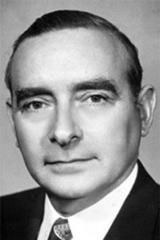Landa, Abram
Personal Papers Archives

Abram Landa (1902-1989), solicitor and politician, was born on 10 November 1902 at Belfast, Ireland, eldest of four children of David Landow, gas fitter, and his wife Annie Lewis, née Shuvalk; he was named Abraham. His parents were Russian Jews who had fled persecution. Abe came to Sydney with his widowed mother as a young child. Early academic promise at Darlinghurst Junior Technical School led to further education, for a nominal fee, at Christian Brothers’ College, Waverley. He won a scholarship to study law at the University of Sydney (LL.B, 1927).
Admitted as a solicitor on 1 June 1927, Landa specialised in workers’ compensation, which brought him into close association with the union movement; he was on the executive of the Federated Clerks’ Union of Australia. A member of the Australian Labor Party from 1919, he became president of the Paddington branch. He was friendly with other lawyers who were active in Labor politics, such as Joseph Lamaro, William Sheahan and, particularly, Clive Evatt. On 10 April 1930 at the Great Synagogue, Sydney, he married Perla Hannah Levy.
That year Landa won the previously safe conservative seat of Bondi in the landslide to Labor. He lost it in 1932 but won it back in 1941 when Labor returned to office under (Sir) William McKell. In 1944-45 he was a parliamentary representative on the ALP State executive. As a result of his friendship with Clive Evatt he became part of the rebel group in caucus, involved in the successful plan to install James McGirr as McKell’s successor in 1947. When this action did not lead to a ministry, Landa continued to be a gadfly. He was a strident critic of alleged links between breweries and the government.
A founder of the Young Men’s Hebrew Association, Landa was a prominent advocate of Jewish causes and a strong supporter of Zionism. He played an important role in persuading H. V. Evatt to support a Jewish state in Palestine, and Landa was an official observer at the United Nations General Assembly in 1949. Throughout his career, he championed the rights of immigrants.
Landa was finally elected to cabinet in 1953, undertaking the portfolios of labour and industry and of social welfare. Price control, trading hours, the basic wage and consumer protection all came under his jurisdiction. He waged a campaign to improve the quality of bread and legislated for better workers’ compensation and long service leave arrangements. He also introduced controversial legislation for 'compulsory unionism', forced on the government by the industrial groups that controlled the executive. In 1956 he moved to housing, adding co-operative societies to his responsibilities in 1959. He retained these portfolios until Labor’s defeat in 1965, presiding over a huge program of inner-city slum clearance, new housing estates and satellite towns.
In his report for 1957-58, the auditor-general, W. J. Campbell, alleged that Landa had used his influence as a minister on behalf of a company represented by his law firm. He stood down while a royal commission inquired into the matter. The commissioner, (Sir) Leslie Herron, found that Landa had not acted improperly but conceded that it would have been 'more prudent and discreet' if he had not become involved. Another controversy was provoked by a proposed rise in Housing Commission rents, which met fierce resistance in caucus in 1962. After bitter meetings and leaks to the press, Landa had to back down, and only a modest increase in rents was approved in 1963.
Landa served on the senate of the University of Sydney (1943-66) and as a trustee of the Public Library of New South Wales (1942-66). In 1965 the new Liberal premier (Sir) Robert Askin named him as New South Wales agent-general in London. The ALP expelled Landa because he had resigned his seat without the party’s permission. Askin’s ploy, which was intended to increase his majority in the Legislative Assembly, miscarried when Labor narrowly retained the seat of Bondi in the by-election. Appointed CMG in 1968, Landa retired in 1970 and returned to Sydney.
A journalist described Landa as a 'short, dark man, invariably in a hurry'. He enjoyed golf and bowls and swam regularly into his eighties. Predeceased by his wife (d.1976) and daughter (d.1986), he died on 10 July 1989 at Hunters Hill and was buried in the Jewish section of Northern Suburbs cemetery. His son, David, State ombudsman in 1988-95, survived him. (David) Paul Landa was his nephew.
If you would like to inspect this record, please request access by following these steps that includes submitting a form to our Head Archivist.
When searching for records, if you are interested in this record only, use this record ID 968 as your search term

